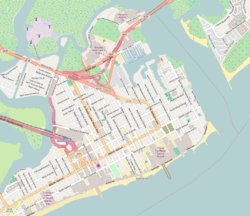Wonder Gardens

Wonder Bar, 1940
|
|
|
Location in Atlantic City
|
|
| Former names | Wonder Bar |
|---|---|
| Address | 1601 Arctic Avenue Atlantic City, New Jersey United States |
| Coordinates | 39°21′44″N 74°25′54″W / 39.36222°N 74.43167°WCoordinates: 39°21′44″N 74°25′54″W / 39.36222°N 74.43167°W |
| Owner | Charles Randall, B.B. King |
| Type | Nightclub |
| Opened | c. 1929 |
| Closed | 2001 |
Wonder Gardens (also known as Wonder Bar) was a jazz and R&B nightclub at 1601 Arctic Avenue in Atlantic City, New Jersey. Established around 1929, it was one of four black-owned nightclubs in the black entertainment district on Kentucky Avenue. Between the Wonder Gardens, Club Harlem, the Paradise Club, and Grace's Little Belmont, the music played all night and into the morning in the district's heyday in the 1940s through 1960s. Presenting both popular jazz musicians and new talent, the Wonder Gardens provided early exposure for Dan Fogel, Harvey Mason, George Benson, and the Commodores. Over the years, the music changed from jazz to rock, soul, and pop music. In 1979 the club was renovated, redecorated and renamed the Latin Wonder Gardens, featuring live Afro-Cuban musical entertainment. In 1991 it underwent a second renovation and name change to the New Wonder Gardens, featuring Latin, jazz, R&B, hiphop, and reggae acts. The club was sold in 2001 and was later demolished.
Originally called Wonder Bar, the jazz nightspot opened around 1929 at 1601 Arctic Avenue, on the southwest corner of Kentucky Avenue and Arctic Avenue. In the 1940s and 1950s it was owned by Charles Randall. At one point B.B. King, a frequent performer at Club Harlem, became a part-owner of the Wonder Gardens and began appearing here exclusively two weekends a year.
In July 1940 the Wonder Bar, Club Harlem, the Paradise Club, and Grace's Little Belmont were raided by police, led by the newly elected mayor, Tom Taggart, seeking proof of illegal gambling activities. The police confiscated "three truckloads of gambling paraphernalia" and arrested 32, then shut down the four clubs. The arrestees from the Wonder Bar included Randall, John Doyle, and Albert Leighton, who all pleaded not guilty and were released on bail. The next day the clubs were open for business as usual. The raid followed a period of unease between the new mayor and black citizens of Atlantic City's north side; earlier, Taggart had filed a restraining order against a white dancer, who bathed in milk during her performance, from appearing at Randall's black club.
...
Wikipedia

